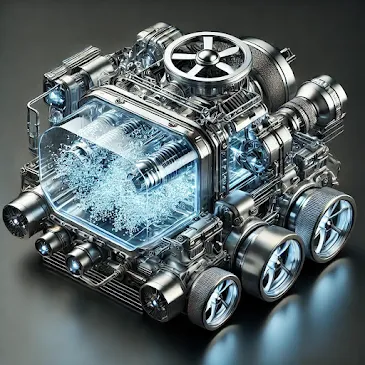For years, the world has been searching for better, cleaner energy sources. Electric vehicles (EVs) are taking over roads, hydrogen fuel cells are gaining momentum, and solar-powered cars are being tested. But what if the real breakthrough has been right in front of us all along? Water—the most abundant resource on Earth—could be the answer to a major energy shift.
The concept of a water-powered engine has intrigued scientists and innovators for decades. But how much of it is real, and how close are we to seeing it in action? Let’s break it down.
How Does a Water Engine Work?
A water engine doesn’t burn water directly like gasoline. Instead, it extracts hydrogen from water, which is then used as fuel. Here’s the basic process:
1. Extracting Hydrogen from Water (Electrolysis)
Water (H₂O) is passed through a device called an electrolyzer, which uses electricity to separate it into hydrogen (H₂) and oxygen (O₂).
The hydrogen is collected and stored for use as fuel.
2. Using Hydrogen for Energy
Once hydrogen is extracted, it can power vehicles or machines in two main ways:
A. Hydrogen Fuel Cells (For Electric Power)
Hydrogen enters a fuel cell, where it reacts with oxygen from the air.
This reaction produces electricity, which can be used to power an electric motor.
The only emission from this process? Water vapor.
B. Hydrogen Combustion (For Traditional Engines)
Hydrogen can also be used in a modified internal combustion engine, similar to gasoline-powered cars.
Instead of burning fuel that emits carbon dioxide, it burns hydrogen, and the byproduct is water instead of harmful emissions.
Some experimental engines also use HHO gas (a hydrogen-oxygen mix) to improve fuel efficiency.
3. Powering a Vehicle or Generator
Whether it’s through a fuel cell or a combustion engine, the hydrogen extracted from water is used to generate clean energy for movement or electricity.
Why Water Engines Could Be a Game-Changer
If this technology reaches full potential, water-powered engines could provide several groundbreaking advantages:
1. No Harmful Emissions
Since hydrogen only produces water vapor when burned, it completely eliminates the pollution caused by fossil fuels.
2. Abundant and Renewable
Water covers over 70% of the Earth’s surface, making it one of the most widely available resources on the planet.
3. Energy Independence
Countries relying on imported oil could shift to producing their own hydrogen fuel from water, reducing costs and strengthening national energy security.
4. Sustainable and Green
If electrolysis is powered by solar, wind, or hydro energy, hydrogen production becomes completely renewable and carbon-free.
5. Long-Term Affordability
While the technology is currently expensive, advancements in electrolysis, storage, and fuel cell efficiency could make hydrogen a cheaper alternative to gasoline and even electricity.
This all sounds promising, but there are still some significant challenges holding back large-scale adoption.
Challenges Facing Water Engines
1. High Energy Requirements
One of the biggest obstacles is that electrolysis requires a lot of electricity. If this power comes from fossil fuels, the environmental benefits are lost.
Possible Solution: Researchers are developing more efficient electrolysis systems powered by renewable sources like solar and wind energy.
2. Hydrogen Storage & Safety
Hydrogen is highly flammable and must be stored under high pressure, making transportation and storage tricky.
Possible Solution: Scientists are working on solid-state hydrogen storage and other safer storage methods.
3. Limited Refueling Infrastructure
Unlike gas stations or even electric charging points, hydrogen refueling stations are rare and expensive to build.
Possible Solution: Governments and private companies need to invest in hydrogen refueling networks, just like they did for EV charging stations.
4. Resistance from the Fossil Fuel Industry
The oil and gas industry makes trillions of dollars annually. A major shift to water-based hydrogen fuel could threaten their market dominance.
Possible Solution: Governments can promote clean energy policies and offer incentives for businesses to transition to hydrogen fuel.
Are Water-Powered Cars Already a Reality?
While a car that runs entirely on water isn’t commercially available yet, hydrogen-powered vehicles are already on the market. Here are a few examples:
1. Toyota Mirai
Runs on hydrogen fuel cells instead of gasoline.
Emits only water vapor—no CO₂ or pollutants.
2. Hyundai Nexo
A hydrogen-powered SUV with a long driving range.
Still limited by the lack of hydrogen refueling stations.
3. Honda Clarity Fuel Cell
Honda’s contribution to hydrogen-powered cars.
Not widely available due to infrastructure challenges.
4. Experimental Water-Powered Vehicles
Over the years, inventors and researchers have experimented with different versions of water-powered systems:
Stanley Meyer (1990s): Claimed to have built a car that ran on water, but his technology was never scientifically proven.
Genepax (Japan, 2008): Showcased a prototype car that ran on water but shut down due to funding problems.
Tata Motors (India): Currently researching hydrogen fuel technology, but no commercial water-fueled car has been released.
So while fully water-powered cars don’t exist yet, hydrogen fuel cell vehicles are a step in the right direction. The biggest challenge is making electrolysis cheaper and more efficient.
What’s Next for Water Fuel Technology?
To make water-powered engines a practical reality, several things need to happen:
More Efficient Electrolysis – Research into solar-powered and nano-enhanced electrolysis could make hydrogen production cheaper.
Better Hydrogen Storage – Scientists are developing solid-state hydrogen storage for safer transportation.
More Hydrogen Fuel Stations – Governments need to invest in hydrogen refueling infrastructure.
Public & Industry Adoption – As demand grows, companies will be forced to invest in hydrogen technology.
Final Thoughts: Can Water Really Power the Future?
Right now, a car that runs directly on water without any external energy source is still far from reality. But hydrogen-based technology is evolving quickly, and with the right breakthroughs, we could see a world powered by water much sooner than we think.
So, what do you think? If water-powered vehicles hit the market, would you drive one? Let’s discuss!






.webp)